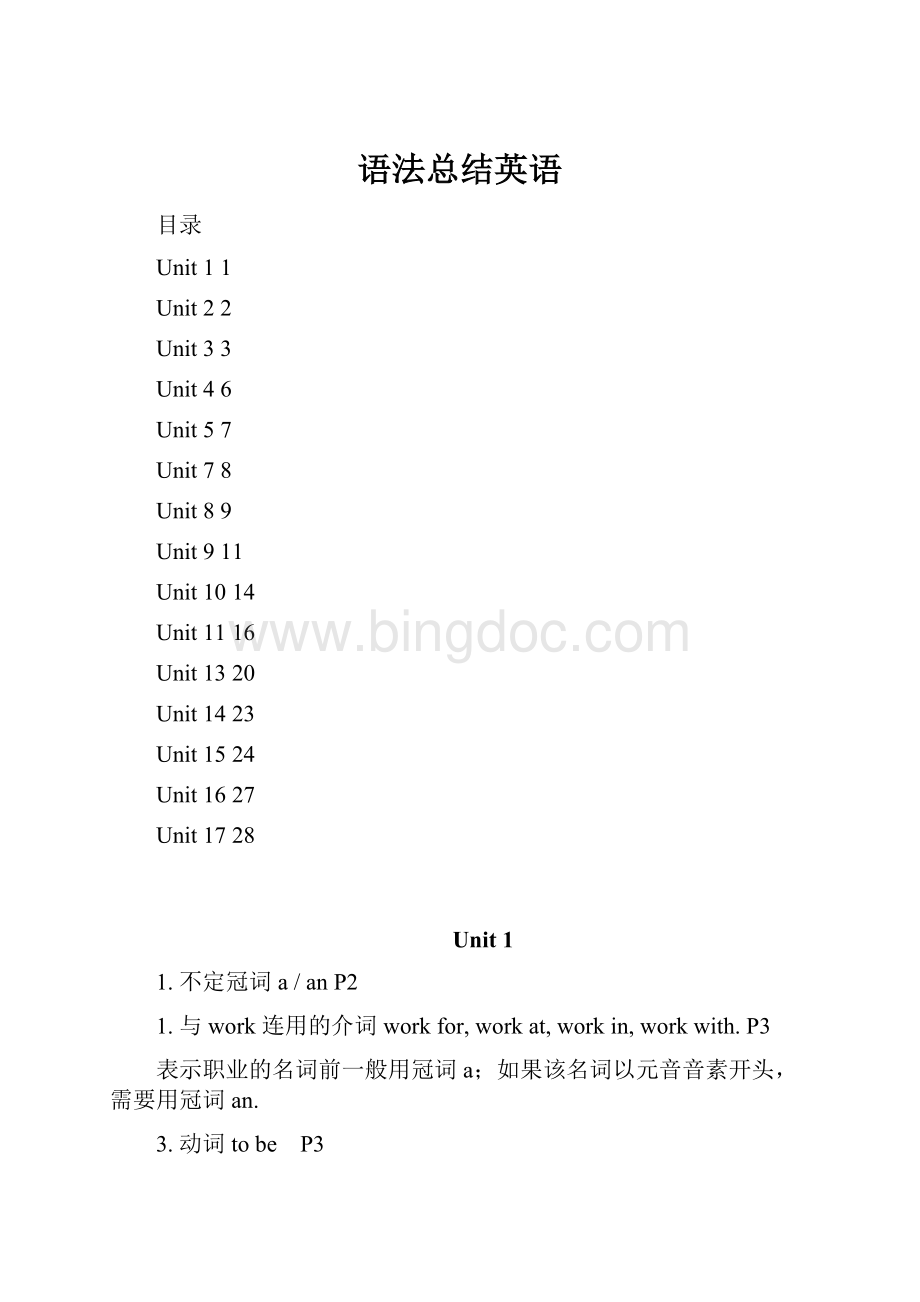语法总结英语.docx
《语法总结英语.docx》由会员分享,可在线阅读,更多相关《语法总结英语.docx(47页珍藏版)》请在冰点文库上搜索。

语法总结英语
目录
Unit11
Unit22
Unit33
Unit46
Unit57
Unit78
Unit89
Unit911
Unit1014
Unit1116
Unit1320
Unit1423
Unit1524
Unit1627
Unit1728
Unit1
1.不定冠词a/anP2
1.与work连用的介词workfor,workat,workin,workwith.P3
表示职业的名词前一般用冠词a;如果该名词以元音音素开头,需要用冠词an.
3.动词tobeP3
介绍自己和他人可以用动词tobe,其形式随主语变化:
IamfromChina.WeareChinese
YouareEnglishYouareteachers主语you是复数,所以名词teacher用了复数形式
HeisamanagerTheyareAmerican
Sheisadeputymanager
ThemanagerisBrithsh
ItisinShanghai
否定句要在动词tobe后面加not,一般疑问句要将动词tobe放在句首:
HeisnotChinese.IsheChinese?
Yes,heis/No,heisnot
Iamnotamanager.Areyouamanager?
Yes,Iam/No,Iamnot.
Sheisnotchinese.IssheChinese?
Yes,sheis/No,sheisnot
Theyarenothere.Aretheyhere?
Yes,theyare/No,theyarenot
将who,what,when,where,how放在句首,构成特殊疑问句:
Whatisyourname?
MynameisWangHua.
Whereareyoufrom?
IamfromNanjing
Howoldareyou?
Iam35yearsold.
Whatisyourjob?
Iamanaccountant
WhereisPeter?
HeisinChina.
Howoldisthemanager?
Heis40yearsold.
2.代词P5
人称代词用于代替人或物:
IYouHeSheWeTheyIt
形容词性物主代词表示所属关系:
MyYourHisHerOurTheirIts
3.在名词后面加-’S表示所属关系
Shlly’sfriendisGreekThemanger’shomeisinLondon.
4.规则动词P6
Live,work都是动词,主语是第三人称单数时,动词词尾加-S,如MarylivesinLondon.
名词负数的规则变化是在名词后加-S
注意以下是不规则变化-要单独记忆
Man—menwoman—womenchild—children
Unit2
1.频度副词
常见的有:
never从不,sometimes有时,often经常,usually通常,always总是
*注意频度副词在句子中有不同的位置
在动词tobe之后:
is,am,are
I’musuallyillonplanes.
AreyouusuallyathomeonMonday?
Heisn’tusuallyillonplanes.
在实意动词之前:
唱,跳,写。
。
。
。
IusuallyworkonFriday。
IsometimesgotoLondon.
在含有助动词(do)的句子中,置于助动词之后、实意动词之前:
Hedoesn’talwaysworkonTuesday.
Idon’tusuallygotoworkbybus.
2.介词at,for,inP18
At(在….时刻)
Ihaveteaatbreakfasttime.(atlunchtime,atdinnertime)
For(作为……..)
Shelikesfishforbreakfast.(forlunch,fordinner)
In(在….期间)
Iworkinthemorning.(intheafternoon,intheevening)
3.动词tohave的含义。
Topossess(characteristics)具有(特点)
Ihaveblackhair
Topossess(things)拥有(东西)
Ihaveacar
Toeatortodrink吃,喝
Hehaslunchinthcanteen
Ihaveasandwichforlunch.
Wouldyouliketohaveacoffee?
4.12小时表达法P21
表示整点过1-30分用past(晚于,过)
12.10Itistenpasttwelve
12.30Itishalfpasttwelve
表示离整点还差1-29分用to(在….之前)
9.40Itistwentytoten
表示“一刻钟”可用aquarter
4.15Itisaquarterpastfive(orfivefifteen)
4.16Itisaquartertofour(orthreeforty-five)
表示“半小时”常用half
7.30Itishalfpastseven(orseventhirty)
表示“午前”用am,表示“午后”用pm,表示“在中午”用atnoon
What’sthetime?
It’s9pm(9o’clockintheevening)
Iusuallytakeanapatnoon.
5.表示时间的介词P22
At表示在某点时间
Shearrivesat7o’clock.
Ihavecoffeeatbreakfast-time
For表示在某段时间
IgoswimmingonTuesdaysfortwohours
From….to表示从某点到另一点的持续时间
Heworksform8inthemorningto6intheevening
5.称呼的使用(Ms女士,Miss小姐,Mrs太太,Mr先生)P24
6.提出请求Couldyou…….P24
Couldyou+dosth常用语表达请求
Couldyouspellit,please?
Yes,ofcourse
Couldyoutellmeyourcarnumber,please?
No,sorry…….
Couldyoucallmeat7o’clock,please?
Certainly
Couldyousigntheregister,please?
Ofcourse
表达提议Wouldyou(动词前+to;名词+原形)
Wouldyoulikesht?
或者Wouldyouliketodusht?
常用来表达提议
长时间的喜欢目前喜欢-短时间
Wouldyouliketohaveacoffee?
Yes,please.
Wouldyoulikeanewspaper?
No,thankyou.Ihaveoneattheoffice.
Unit3
1.提议与应答
(1)P28
Wouldyoulikeadrink?
/somecrisps?
Wouldyouliketocomtotheshoponeday?
对“提议”的应答通常为:
Yes,pleaseNo,thanks
Yes,Iwould,thanks.No,Iwouldn’t,thanks.
“提议”还可以用以what开头的疑问句表达,例如
Whatwouldyouliketudrink?
I’dlikeaginandtonic,please
Whatwouldyoulike,Polly?
I’dlikeaglassofwine,thankyou
I’dlikesomecrisps
2.提议与应答
(2)willnot=won’t将来时态
主动提出自己做某时,常用的句式为I’ll(Iwill)+动词原形,例如:
I’llbuythedrinks
3.序数词P32
多数序数词由基数词加-th构成,如
Sixsixth
Eleveneleventh
Eighteeneighteenth
Thirty-fivethirty-fifth
Fiftyfiftieth
Hundredhundredth
以下词例外
First(第一),second(第二),third(第三)
Fifth(第五,先将基数词中的-ve,改成-f,再加-th)
Eighth(基数词后加-h)
Ninth(去掉基数词中的-e)
Twelfth(先将基数词中的-ve改成-f,再加-th)
Twentieth,thirtieth,fortieth…..(第二十,三十,四十…..将基数词中的-y改成-ie再加-th)
序数词有简写形式,例如:
first--1stsecond---2ndthird---3rdfourth--4th
4.楼层的表达P33
在英国“一层”用groundfloor,firstfloor指“二层”;
在美国,firstfloor指“一层”
5.不定冠词a/an和定冠词the的区别P34
不定冠词a/an与可数名词的单数搭配,相当于汉语中的“一”,指某一类人或事物中的非特指的“任何一个”。
定冠词the与可数名词的单数、可数名词的复数和不可数名词搭配,指独一无二的事物或已被提到的人或物。
Iamanaccountant(我是一名会计:
会计中的一员。
)
IamtheChiefAccountantforABHKBank.(我是ABHK银行主任会计师:
该银行中唯一的一名)
ThesearethebooksIlike.(这些是我喜欢的书:
特指某些书)
Sheisareceptionist.(她是一名接待员;公司里有好几名,她是其中之一.)
Sheisthereceptionist.(她是接待员:
公司里仅她一名接待员.)
同样,大楼中只有一个“一层”,一个“二层”,因此,表达楼层十用定冠词:
thegroundfloor,thefirstfloor,thesecondfloor
1由普通名词构成的专有名词,thegreatwall
2用于乐器
3习惯用语中,intheaffternoon
4用于姓氏的复数形式前,thessmathis
5用形容词的最高级,thebest
6.指示代词this,these,that,thoseP34
单数形式(Singular)复数形式(Plural)
This这个These这些
That那个Those那些
通常this(these)指离说话人较近的物品,that(those)指离说话人较远的物品。
指示代词既可以单独使用,也可以与名词连用。
Xiaoyan,thisisPolly,mygirlfriend.
Thesepeoplearemyfriends
ThatisFranknearthedoor
Thosepeopleinthecararehisbrothersandsisters.
指示代词可以用于表达对比的意义。
(说话时伴随用手指点动作)
Thisismycoffeeandthat’syours.
Thesearemybooks.Thoseareyous.
Thesepeoplearemyfriends.Thosearemyhusband’sfriends
指示代词可用于强调,例如
Thatisreallystupid!
Thosearenogoodatall!
Ireallydon’tlikethis!
7.Thereis/thereare句型的使用P37
表示“在某处(如在房间里)有/存在…..”可以用thereis/thereare….结构
如果名词为复数,动词用are,名词为单数,动词用is,例如
Thereisamanintheoffice.
Therearetwoplantsinthehouse.
疑问句要将is/are置于句首(Isthere…?
Arethere….?
)例如
Isthereafaxintheoffice?
Arethereanyplantsinthereception?
对一般疑问句的回答通常用简略形式
Isthereacoffeemachineintheoffice?
Yes,thereis.
IsthereaTVintheoffice?
No,thereisn’t.
Aretheredesksinthereception?
Yes,thereare
Aretherefaxmachinesinthereception?
No,therearen’t
Unit4
1.谈论工作P42
●在表示工作的词前用a或an.
涉及工作地点的时候,在名词前要用a/an或the一般来说,a/an泛指众多中的一个;the特指某一个
●在谈及工作领域的时候,如banking,teaching,computers,用介词in
He’sinmedicine
Theyworkincomputers
●询问别人的工作,可以说“What’syour/his/herjob?
。
另外一种问法是用动词todo.
Whatdoyoudo?
I’manaccountant
Whatdotheydo?
Theyworkinabank
2.现在进行时
(1)P47
表示此刻正在发生的事情或正在进行的动作,用现在进行时:
IamwaitingforanimportantcallfrommybossinShanghai.
He’stalkingtoacustomer
结构是:
主语+tobe+动词ing形式
否定形式是在动词tobe后面加not
Mycomputerisn’tworking
I’mnoteatinglunch.
Theyaren’tworkongtoday
一般疑问句的形式是:
疑问句+tobe+主语+动词ing形式
Whatareyoudoing?
你在干什么
Whereishehavinglunch?
他正在什么地方吃午饭?
Whataretheywaitingfor?
他们在等什么呢?
3.现在进行时
(2)P49
也可以表示这一段时期正在进行的活动,虽然在此时此刻这个活动可能并没有进行。
例如:
LiJunisworkingonanewdatabaseatthemoment,butrightnowsheissleeping.
(LiJun正在建一个新的数据库,不过此刻她正在睡觉。
)
WngLiisplanninganewmarketingcampaignatthemoment,butrightnowheisvistingNewYork.(WangLi正在策划一个营销活动,不过此时他正在访问纽约。
)
LiuFaniscurrentlyworkingonTVadvertisements,butrightnowhe’sonholiday.
(LiuFan目前正在从事电视广告的工作,不过此刻他正在度假。
)
Unit5
1.澄清意思P56
询问一个词是什么意思,用动词tomean.
Whatdoes“sml”mean?
Sml-whatdoesitmean?
回答时主语可以用代词It
Itmeanssmall.
还可以用一般疑问句
Does“avail”meanavailable?
Yes,itdoes.
Does“pm”meanmorning?
No,itmeansafternoon.
2.提出建议P57
1Whatabout+v-ing?
动词+ing
Whataboutseeingthisflat?
名词或名词性短语.whataboutacupofcoffee
2Howabout+v-ing?
Howaboutgoingtoanestateagent?
3Whydon’tyou+verb(动词原形)
Whydon’tyougotoanestateagent?
回答:
Well,Idon’tknow。
(表示她说不准这个建议好不好。
)
Yes,that’sagoodidea.(表示她赞同这个建议)
3.询问价格P60
用Howmuch开头,动词用tocost或者tobe。
例如
Howmuchdoestheflatcostamonth?
Itcosts£500.
Howmuchdotheycost?
Theycost£50each.
Howmuchistheflat?
It’s£500amonth.
Howmuchisitamonth?
Howmucharethey?
Theyare£50each
在英国货币中,100便士(pence)为1英镑(pound)。
便士的符号是p,放在数字后面;英镑的符号是£,放在数字前面。
例如:
£2.45读作twopoundsfortyfive(pence)
90P读作ninetypence或nineyp
£24读作twenty-fourpounds
£1读作onepound
Unit7
1.提供建议P73
Howabout….?
Whatabout…..?
和Whydon’tyou…?
Howaboutseveno’clock?
Whatabouttakingataxi?
Whydon’tyoutakethetube?
2.询问花多长时间P75
动词totake,可以表示“花费(时间)”,用在“Ittakes+(时间)+todosth”
Howlongdoesittaketogettoyourhousebytube?
Ittakesabouthalfanhour.
动词totake的否定句和疑问句的构成同其他实意规则动词一样。
例如:
Howlongdoesthejourneytake?
Theflightdoesn’ttakethreehours.Ittakestwo.
3.表达批评P78
表达批评性评论常用的句式是“too+形容词”或者“not+形容词+enough”这两种句式意义相近,意为“太…..”,“不够.…”
Thekitchenistoodark.
Thetableisnotbigenoughfortwopeople
4.打电话用语P80
1接电话
在家里,拿起听筒接电话十常用hello开头,相当于汉语中的“喂”。
在办公室,接电话的人通常自报家门,比如单位的名称,有时还要说出自己的名字。
例如
(Goodmorning),CaffeRoma.
(Goodafternoon),CaffeRoma.FrancoRossispeaking
2打电话
在公务或比较正式的场合,打电话的人会先介绍自己。
例如
Goodafternoon.ThisisLinXiaoyan.I’mcallingabout…..
Hello,thisisFrancoRossispeaking.
在较随意的情况下或跟听话人很熟悉时,可以这样介绍自己
Hello,Franco(Rossi)here.
3请人接听电话
Could/CanIspeaktoFrancoRossi,please?
IsSallythere,please?
4询问打电话/接电话者接电话者问打电话的是谁,通常这样说
Who’scalling,please?
接电话者恰好就是要找的人,可以这样说
IsthatPollyWilliams?
Isthatyou,Mary?
5接听找人电话时,可以说:
Onemoment,please.Sorry,he/sheisnotin.
Holdon,please.Sorry,I’mafraidhe/sheisout.
Sorry,wrongnumber.
6留口信
请对方转达口信,可以说:
Could/CanIleaveamessage,pleas?
7记录口信
主动提议为他人记录口信,可以说:
CanItakeamessage?
5.安排约会P82
建议日期:
AreyoufreeonWednesday?
WhataboutFriday?
建议具体时间:
Howabout6o’clock?
Is6o’clockokay?
表示同意约定的时间、地点:
Yes.Wednesdayisfine.
Yes.6o’clockisfine.
Yes.That’sokay.
Yes.That’s